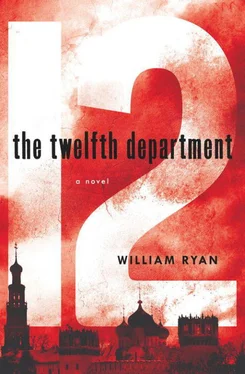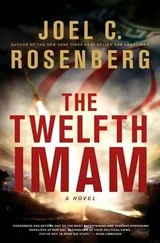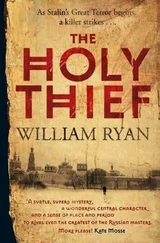“Yes, Comrade Captain.”
“But Kuznetsky, before we forget completely, who did they call?”
Kuznetsky swallowed and his eyes managed to focus on Korolev. He took his notebook from his pocket.
“Professor Azarov made two calls on the morning of his death. The first to a Colonel Zaitsev at the Lubyanka just after nine o’clock and a second to the Bersenevka Militia Station at 11:05.”
The second phone call would have been Galina Matkina calling to report the professor’s murder. As for the first, Korolev opened his mouth to say something and then thought better of it. There were times when it was best to think carefully before you said or did anything and this was one of them.
“Also, someone telephoned Dr. Shtange from the Azarov apartment on Tuesday morning—at eight o’clock.”
Korolev decided not to say anything about this piece of information either. Colonel Zaitsev and his men were still investigating the Azarov murder at that stage, but they’d left the apartment by then, hadn’t they? Or had they?
“What about Priudski’s phone?”
“Four outgoing calls to the same number at a quarter past eleven, a quarter past twelve, at twenty to two and at three-thirty. Also a call to Petrovka at half past one.”
Korolev had made the 1:30 call—to talk to Popov.
“Do we know whose number the other one is?”
Kuznetsky’s misery seemed to deepen. “I called the number and asked who it belonged to, but they told me to mind my own business.”
“Did you say who you were?”
“No. But they’ll only have to call the operator to find out where the call came from.”
“I see. The Comrade Lieutenant’s friends, do you think?”
Kuznetsky really did look as if he were having the worst of days.
“Kuznetsky, we’ll keep quiet about this. If it blows up, which I don’t think it will—well, I asked you to make the calls and I’ll square it with the powers that be, all right? As it happens, this is very useful information. Just keep quiet about it for the present.”
“Of course, Comrade Captain.”
Kuznetsky looked relieved. He tore the pages from his notebook and handed them to him.
“You asked about calls from this number as well.” Kuznetsky nodded to the telephone on Shtange’s desk.
“Go on.”
“Two—one to the doctor’s wife in Leningrad on Monday evening and one to the Commissariat for Health on Monday afternoon.”
Nothing odd there at least.
“Thanks, Kuznetsky. Now, go and find Slivka.”
Korolev followed the youngster to the door, thinking about the professor’s call to Zaitsev and wondering what might have been said in it. As for Priudski’s calls—they’d no doubt been to his NKVD handler, whoever that was. Maybe he’d worked for Zaitsev’s Twelfth Department—which would explain Korolev’s reception at the institute, as well as the colonel’s showing up at Azarovs’ apartment later that afternoon.
* * *
When Kuznetsky had left, Korolev locked the apartment’s newly repaired door, took the report from under his arm, and walked through to the study. He sat down at Shtange’s desk and placed the envelope in front of him. He looked at it for a moment, reached forward to open it, then paused, pushed back his chair and pulled out the bottom drawer of the desk. There was a cavity beneath it. It would do. Temporarily at least.
Satisfied he had somewhere to hide the document quickly if needed, he slipped the report out of the envelope and ran his finger along its edge—some of the blood-browned pages were stuck together and couldn’t be unstuck, at least not without ripping them, but they were relatively few—and mainly at the beginning, where it seemed Dr. Shtange had written an introduction. The name of the person to whom that introduction was addressed was obscured, but it was someone familiar with the institute—“as you indicated,” “as you are aware” … It seemed clear from its blunt findings that the report had never been intended for general circulation.
The report was divided into four parts. The first section concerned the scientific basis of the research being undertaken by the institute and, to judge by the notes in the margin, Azarov had taken exception to many of the points made. The next was entitled “Procedural Failures and Inconsistencies” and Azarov had scribbled on much of this as well. The third part, by far the shortest, was entitled “Ethical Considerations,” while the fourth and last of the main sections covered “Financial Irregularities.”
Finally there was a brief conclusion. In Shtange’s opinion, Korolev read, Azarov should be replaced and the institute’s research restricted to the few areas where progress was achievable—and even then a complete overhaul of the research methodology would be necessary. It seemed Shtange considered that nearly all the work done up until this point had been an expensive waste of time.
Korolev turned back to the beginning and began to discover exactly what the institute had been up to. Telepathy, it seemed, had indeed been one area of research—although Shtange considered that there was no scientific basis for it and the results, so far, had produced nothing to change his mind. Korolev was curious as to what “re-education and mental manipulation of enemies” might be, and discovered the aim was to scrub enemies’ minds of counterrevolutionary bias and to replace it with pro-Soviet thinking. Shtange set out the means by which Azarov had attempted to cleanse the subjects’ minds and it was a disturbing list—surgery, electricity, a surprising variety of drugs, sensory deprivation, fear—the list went on and on.
Some of Shtange’s summaries set Korolev’s hair on end:
Surgery has certainly succeeded in erasing counterrevolutionary thinking, but only by erasing all mental processes permanently. In other cases, surgical intervention left subjects physically or mentally incapacitated—sometimes both. On several occasions surgical experimentation has resulted in the death of the subject on the operating table. There is no evidence that any of the professor’s surgical techniques have resulted in material progress, despite claims to the contrary.
Electrical treatment had been more effective in Shtange’s view—“Subjects’ memories have been erased, along with preconceptions of behavior and thought, when repeated high-voltage electrical shocks to the cortex have been administered for sustained periods.” The problem was putting the correct thinking back in, it seemed, and Shtange recommended this as one of the few areas where further research might be undertaken—although he referred the reader to reservations that he would address later on in the report.
By this time, however, Korolev was feeling sick to his stomach. It was clear to him that, in among all the medical jargon and bureaucratic dodging, these brain doctors had been doing things that human beings shouldn’t damned well do to other human beings. And what was more, he couldn’t help but remember the small beds he’d seen at the institute. Had these rats been opening up the heads of youngsters? Electrocuting children? The orphanage director had said many of the boys had come back from the institute with small scars on their cheeks—was this the explanation? He thought of the scar on Goldstein’s face and the terrible thought occurred to him that his Yuri was, likely as not, in the hands of people who’d something to do with this. He gritted his teeth and read on.
Now Shtange was talking about new methods for recovering information from “reluctant” sources. All those methods that had been attempted for “re-education” had also been tried for this purpose, as well as more traditional methods of torture. Because that’s what they’d been doing—torturing those who’d been held there. Korolev remembered the strange cells and their prison stench. If he’d ever had any doubt as to what the place had been for, this report explained it to him in detail. And alongside each of Shtange’s negative comments, Azarov had written a defense. In some places his writing was illegible—written with a hand so heavy it had torn the paper. But in others some sort of logic was apparent—if logic was possible from such a man.
Читать дальше












